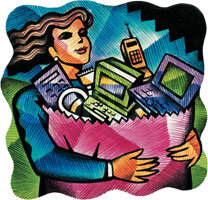One of my favorite Sunday School lessons that I taught the younger elementary age class was the simple principle: “Patience is a Good Thing.” That was probably my Dad’s strongest spiritual trait – he was extremely patient, despite the circumstances. Wikipedia defines patience as the ability to endure waiting, delay, or provocation without becoming annoyed or upset, or to persevere calmly when faced with difficulties.
Apparently Americans are fast losing their appetite to wait for any type of service.
Calvin Woodward in the Associated Press reports:
We’ll make this quick. We know you’re busy.
An Associated Press poll has found an impatient nation. To get to the point without further ado, it’s a nation that gets antsy after five minutes on hold on the phone and 15 minutes max in a line. So say people in the survey.
The Department of Motor Vehicles, the U.S. version of the old Soviet bread line, is among the top spots where Americans hate to wait. But grocery stores are the worst.
Almost one in four in the AP-Ipsos poll picked the grocery checkout as the line where their patience is most likely to melt like the ice cream turning to goo in their cart.
And it seems people don’t mellow with age. The survey found older people to be more impatient than younger people.
Nor does getting away from the urban pressure cooker make much difference. People in the country and the suburbs can bear a few more minutes in a line before losing it than city inhabitants can, but that’s it.
In short, Americans want it all NOW. Or awfully close to now.
“If you ask the typical person, do you feel more time-poor or money-poor, the answer almost always is time-poor,” says Paco Underhill, an authority on what draws and drives away shoppers.
“We walk in the door with the clock ticking with various degrees of loudness in our heads. And if I get to the checkout and if I have the perception it’s not working efficiently, often that clock gets even louder.”
In other words, it’s not just how long you wait, but how you wait. Creative merchants turn waiting time into something approaching quality time. A lot don’t.
A free-for-all deli counter that doesn’t let people take numbered tickets is a flashpoint for frayed nerves. But if managers approach shoppers in a long line and help shepherd them to the right counter, they’ll have happier sheep.
The typical supercenter shopper spends 25 to 30 minutes in the store, but many think they’ve been there an hour, Underhill says. His company, Envirosell, monitors the behavior of shoppers and sellers across the U.S. and in other countries.
Americans are demanding. Half in the AP-Ipsos poll said they refuse to return to businesses that made them wait too long. Nearly one in five owned up to speaking rudely to someone in the last few months when they weren’t served efficiently.
Hana Sklar, 23, lives in New York and wants things done, yes, in a New York minute.
A native of Australia, where “it’s relaxing, calm, everyone takes their time,” Sklar now lives in Brooklyn and says she typically loses patience after waiting less than one minute in a line or on the phone.
The snail’s slither to the post office counter drives her the nuttiest. “By the time you get there and it’s your turn, there are only two people working there,” she said. “It’s not only me getting angry. Everyone is talking about it.”
Now meet one of the most patient men in America. John Vivian, 72, of Lantana, Fla., can wait “hours” on hold on the phone. “I spent 23 years in the military and if you spent 23 years in the military, you don’t lose your patience.”
He worked for just as long behind the post office counter, giving him a really thick skin. “Life is too short to be upset,” he says.
Underhill says post offices and some DMVs have improved in recent years but grocery stores are notably poor at managing crowds, especially considering busy times are so predictable.
One solution: Online ordering of routine purchases, which make up 80 percent of the shopping cart.
This would transform the store into a series of “pleasure centers” where people linger over the gourmet cheeses, fancy breads and fine wines, then pick up the bagged-and-ready staples they ordered earlier from the home or work computer.
Overall, 60 percent in the survey said they can usually wait no more than 15 minutes in a line before losing their cool.
Their fuses are even shorter on the phone.Nearly four in five respondents in the survey said their patience has run out while being kept on hold.
As if by some cruel joke, phoning the phone company is often a path to madness.
“I stayed on the phone once for an hour, just to see how long it would take,” said Janet Collier, 76, of Macdon, N.Y. “It was just stubbornness.”
Asked if she finally gave her carrier an earful, she laughed and said, “I’m not with them anymore.”
Exasperation with phones extends to cell service. Underhill described cellular company stores as “locations of last resort” for customers who have been put through all manner of nuisance trying to get their service needs met or their questions answered on the phone or computer. Many come in those doors already upset.

